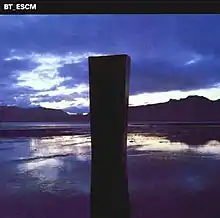| ESCM | ||||
|---|---|---|---|---|
 | ||||
| Studio album by | ||||
| Released | September 22, 1997 | |||
| Studio | Blue House on a Hill Studios (Maryland) Omega Studios (Rockville, Maryland) Abbey Road Studios (London, United Kingdom) | |||
| Genre | Electronica, trance, progressive trance, drum and bass, breakbeat | |||
| Length | 76:04 (UK CD) 71:23 (US CD) 83:40 (LP) | |||
| Label | Perfecto/Kinetic/Reprise/Warner Bros. Records 46799 | |||
| Producer | BT | |||
| BT chronology | ||||
| ||||
| Singles from ESCM | ||||
| ||||
| Review scores | |
|---|---|
| Source | Rating |
| AllMusic | |
ESCM (initialism for Electric Sky Church Music)[2] is the second studio album by American electronic musician BT, released on September 22, 1997.
Background and recording
Following Ima, Transeau branched out to create club anthems such as "Flaming June", while also drawing inspiration from drum and bass as well as hip hop. ESCM also features Transeau adding live guitar, bass and drums to songs, as well as the use of a strings ensemble.
The majority of the album was produced and mixed by Transeau at Blue House on a Hill Studios, with the exception of string recordings that were done at Abbey Road Studios in London. "Solar Plexus" was recorded partially at Omega Studios in Rockville, Maryland.
Amongst the tracks recorded during the sessions but left unreleased were the track "Lemon Balm and Chamomile", written with Che Malcolm, and "Flesh", written with Jan Johnston. The latter track would later be remixed for a single release by Johnston in 2001.
Release
The album was released on 22 September 1997 and supported by three singles; "Flaming June", "Remember", and "Love, Peace and Grease", all of which charted in the UK.
Like Ima, ESCM was also mixed to sound like one continuous mix. For US pressings, the loungy drum and bass track "The Road to Lostwithiel" was replaced with the more straightforward "Lullaby for Gaia". Both songs were later made available, in unmixed form, on the retrospect album, 10 Years in the Life. The US pressing also features an edited version of "Love, Peace, and Grease".
The cover of the album and its singles feature an interpretation of a Monolith from Stanley Kubrick's 2001: A Space Odyssey.[3]
Track listing
All tracks by Brian Transeau except where noted.
| No. | Title | Length |
|---|---|---|
| 1. | "Firewater" (with T.H. Culhane) | 8:42 |
| 2. | "Orbitus Teranium" | 8:10 |
| 3. | "Flaming June" | 8:31 |
| 4. | "The Road to Lostwithiel" | 8:38 |
| 5. | "Memories in a Sea of Forgetfulness" (with T.H. Culhane) | 7:40 |
| 6. | "Solar Plexus" | 4:14 |
| 7. | "Nectar" | 5:55 |
| 8. | "Remember" (with Jan Johnston) | 8:01 |
| 9. | "Love, Peace and Grease" | 5:21 |
| 10. | "Content" (contains an excerpt from "Flaming June (Simon Hale's Orchestra)" as a hidden track) | 10:51 |
| Total length: | 76:04 | |
| No. | Title | Length |
|---|---|---|
| 1. | "Firewater" (with T.H. Culhane) | 8:42 |
| 2. | "Orbitus Teranium" | 8:10 |
| 3. | "Flaming June" | 8:31 |
| 4. | "Lullaby for Gaia" (with Jan Johnston) | 5:26 |
| 5. | "Memories in a Sea of Forgetfulness" (with T.H. Culhane) | 7:40 |
| 6. | "Solar Plexus" | 4:14 |
| 7. | "Nectar" | 5:55 |
| 8. | "Remember" (with Jan Johnston) | 8:01 |
| 9. | "Love, Peace and Grease (BT Puma Fila Edit)" | 3:52 |
| 10. | "Content" (contains an excerpt from "Flaming June (Simon Hale's Orchestra)" as a hidden track) | 10:51 |
| Total length: | 71:23 | |
Personnel
- Simon Hale – strings arrangement on "Firewater", "The Road to Lostwithiel" and "Remember"
- Thomas Henry Culhane, Ph.D. – vocals on first half of "Firewater" and on "Memories in a Sea of Forgetfulness"
- Paul van Dyk – additional production on "Flaming June"
- Jan Johnston – vocals on "Lullaby for Gaia" and "Remember"
- Vini Reilly – flamenco guitar on "Remember"
- BT – all other vocals, instruments and programming
Charts
| Chart | Peak position |
|---|---|
| UK Albums Chart (OCC)[4] | 35 |
References
- ↑ Ned Raggett (1997-09-22). "ESCM - BT | Songs, Reviews, Credits, Awards". AllMusic. Retrieved 2014-08-22.
- ↑ Archived July 14, 2010, at the Wayback Machine
- ↑ "Electronic Music Critic: BT - ESCM". Electronic Music Critic. Retrieved 26 April 2018.
- ↑ "BT - Chart history". Official Charts Company. Retrieved 10 August 2017.